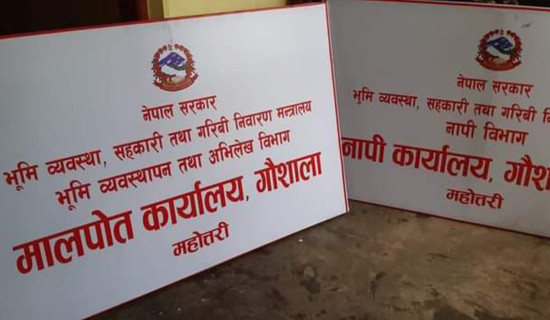- Monday, 2 February 2026
Media Vital For Social Transformation
Yug Bahadur
There is no doubt that the media is one of the most important parts of any society. Besides providing fresh information to the people, it has also helped in ending wars, quelling strife and reporting about the differing of people in different circumstances. In Nepal, the media has also helped in bringing major political changes and also keeping government and other officials on their toes so that they will not tread on the wrong path for the detrimental of the nation as a whole and also the general public. We cannot say the media has been successful at all times, but it has contributed a lot in the political and social betterment of the nation.
Like already mentioned, in the past, the presently senior journalists mostly were practicing ‘mission’ journalism. They were on certain political missions. And one cannot dismiss the major roles played by the media in making a success of the different political agitations, which brought change to Nepali politics as well. On a lighter note, there once was a survey carried out by a media outlet or some other organisations, which asked the students studying in a girls’ college, whom they would marry. It seems no one wanted to marry a journalist. In a similar manner, it used to be the last choice of any person to become a journalist.
Journalism course
But this situation has drastically changed and there are not only different institutions giving courses in journalism, there are also hordes of young people who want to join this profession, sometimes just for the ‘exposure’ they get. This is especially true in the broadcast journalism, or says TV, to be more precise. But apart from the difficult days of the past when individuals became journalists just because they could write and they had a desire for political change, a time came in the late 1970s, when for the first time in its history the Tribhuvan University, the only university of that time in the country suddenly expand its courses and also included journalism as a subject in what today we call Class I, which was called IA First Year or Certificate level at that time.
This author was one of the first students to enrol in this class. But he did not join this course for glamour, some deep inside political feelings or he did not get any other job opportunities. This was a professional course where if one did well, he or she could become a good professional that could help in uplifting this sector. Sadly, there were not enough people to start the class, but the college gave everyone another chance and finally we had enough students to start our course. After we passed the final examination, there was no other college giving higher level classes in this subject. And either some students dropped out and took up their courses and only a few of us dared to wait hoping this course would be started next year.
After this also few dared take up journalism in earnest. Reporting, running here and there, taking the opinions of the people, speaking from behind the news desk and doing so many other works journalists do. This also gives me an opportunity to talk of all these hustling and bustling journalists of these days do and do them in a bold manner. It definitely gives me a positive energy. But this is also the opportunity to say that some journalists are not working ethically, forget following the code of conduct of the profession. At a time when the whole journalistic sector is doing so well in whatever they can hear such negative comments does not sound music to the ears.
And indeed, it is only a handful of individuals in the name of journalists who are trying to hoodwink the people in general. So, all must be careful of such people, who are trying to pull down the prestige of a part of the society that is so important for providing correct information to the public, bringing political change and ushering in social awareness which is good for all. Many old-timers have seen the leaps and bounds taken by journalism, not only training wise, but also technologically. Many old-timers remembering newspapers, mostly weeklies and any other material, printed in a ‘hand press’ which was an art in itself. Then came photocompose, which was first used for newspaper printing probably by publications of Gorkhapatra first.
Media freedom
Now we have so many sophisticated gadgets and also page makers which all machines make the work of a News Desk editor much easier, at least as far as counting letters before making a headline. But the biggest hurdle crossed by the media sector is in bringing changes to the strict regulations of the past governments when journalists could even be jailed. This freedom won by the journalism sector was also made possible by not only Nepali journalists struggling time and again against the stringent rules of the past, but also through a global effort under the International Federation of Journalist (IFJ), which has members from all over the world and which puts under pressure any side or governments that harass or even jail working journalists.
This gives much breathing space for working journalists, especially those who have to go to dangerous places to provide pictures, information and detailed reports from such fields. It is no wonder many journalists have lost their lives, have become wounded or captured by rebel forces. This is the time when all journalists have to come together to show their solidarity with their fellow workers and not be cowered down by threats and harassments. Here in Nepal also, in recent times we have seen differences among different groups, but such problems have to be surmounted with wisdom if we are to move ahead as a united front.
(Yug Bahadur is a freelance writer.)
















